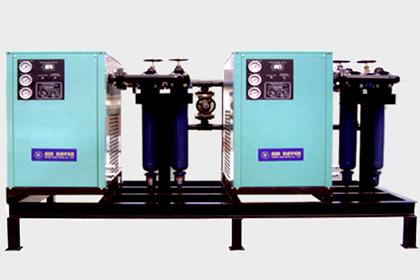 KADM SERIES
KADM SERIES
It eliminates moisture effectively from the compressed air containing large amount of moisture through primary (Air-to-Air) and secondary (Air-to-Ref) heat exchanges, and boasts of excellent durability suitable for marine use.
Features
 Time-honored Tradition and Accumulated Technological Strength
Time-honored Tradition and Accumulated Technological Strength
Troubles are minimized and performance is maximized through time-honored tradition and accumulated technological strength
Air Gauge / High & Low Pressure Gauge
The air outlet pressure gauge and the pressure gauge for refrigerant is installed on high pressures side and low pressure side are installed on the gauge panel on the front side to check the pressure status at a glance
Environment - friendly RefrigerantUses environment-friendly refrigerants (R-134a, R-404A, R-407C)
High Pressure Switch / Abnormal Alarm Lamp
- High Pressure switch is installed to protect refrigeration compressor.
- When abnormal pressure occurs, Abnormal Alarm Lamp of the front gauge panel will turn on and power to the power to the refrigeration compressor will be shut off to prevent damage.
- High Pressure Switch is installed to protect refrigeration compressor.
Power Coating
It applied powder which is strong against scratch and corrosion. Designed in bolting type structure to allow easy maintenance and repair.
Protect Device
Fuse, circuit breaker, and overload relay are installed to prevent damage against over current and abnormal amphere.
Operating Principle

Operating Principle 1
The compressed air in a saturated state is pre-cooled by exchanging heat with cooled air discharged when flowing into the Air-to-Air heat exchanger. The pre-cooled air flows into the Air-to-Refrigerant heat exchanger and is cooled by refrigeration system.
Operating Principle 2
In other words, the hot and wet saturated inlet side compressed air is pre-cooled in the heat exchanger to reduce thermal load of the evaporator and is sent to the evaporator and cooled again in the evaporator down to the dew point. The air, cooled down to the dew point, then passes through the evaporator, and its temperature is raised by the hot inlet air in the heat exchanger, and the relative humidity will drop further.
Operating Principle 3
The refrigerant, compressed in the refrigeration compressor and cooled in the condenser, is sent to the evaporator through the expansion valve. Here, the expansion valve converts the hot high pressure liquid refrigerant into the cool low pressure liquid refrigerant so that it would evaporate easily in the evaporator, and sends the liquid refrigerant to the evaporator based on load variation, Adjust the hot gas bypass valve appropriately to prevent overcooling of the evaporator.
Operating Principle 4
The refrigerant, decompressed and expanded at the expansion valve, takes the heat away from the compressed air while it is vaporized in the evaporator. In this process, most of the vapor in the compressed air is condensed into water and discharged to the outside through the automatic drain valve installed to the dryer.












